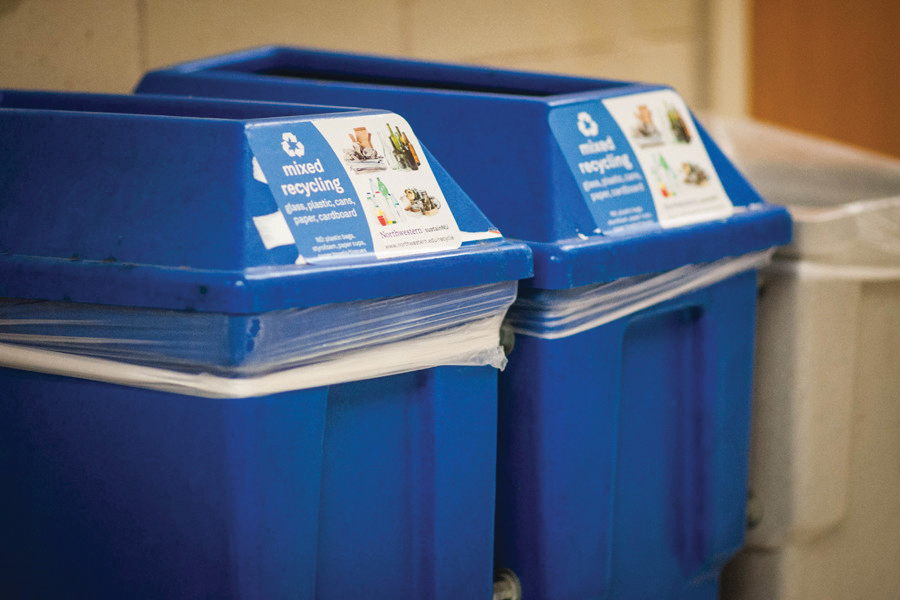NU students welcome new decade of sustainability on campus
Daily file photo by Daniel Tian
Students are taking sustainability initiatives at the Northwestern campus.
January 22, 2020
Growing up near the Smoky Mountains in Tennessee, Communication junior Maggie Olson said she naturally became passionate about the environment.
At Northwestern, Olson started working at sustainNU, where she wrote communication materials on Leadership in Engineering and Environmental Design, a program that certifies campus buildings that are resource-efficient. Through the job, Olson said, she found her calling.
“I am very into waste management,” Olson said. “I am obsessed with it.”
Olson is not alone in supporting sustainable practices while studying at NU. While statistics on student sustainability habits are unavailable, a 2015-2016 survey by the Associated Student Government reported 73.2 percent agreed or strongly agreed that they or student organizations would use reusable plates and utensils if they were provided for free.
Olson said she is now working on developing a universal symbol and a bin color for composting, the “next step of waste management.” In her off-campus apartment she shares with two other students, Olson composts through Collective Resource, a food recycling service that charges $20.50 per household every month for Evanston residents.
Other students said they found themselves concentrating their efforts elsewhere.
Sam Liu, a Communication sophomore, co-founded NU Thrift after seeing that there were no affordable second-hand clothes shopping options near campus. The program, which opens a thrift pop-up at Norris University Center selling items for about $2 each, has plans to expand to a more permanent location, Liu said.
Producing cotton and other fabrics use a lot of water and energy, Liu said. Once people throw away clothing items, they usually go to landfills or are incinerated, which creates even more pollution.
“There’s a lot of life in certain articles of clothing and because it’s out of style or people are just done with it, they throw it out — this should not be the case,” Liu said. “If you do reuse an article of clothing … that entire process (of creating and destroying garments) is foregone, so you don’t waste those resources.”
Besides thrifting for clothes, Liu said students can practice sustainable consumption by carrying reusable bottles and get around campus by energy-efficient means.
Lauren Simitz, a McCormick junior and chair of sustainability at ASG, said she is involved in educational initiatives that inform students about being more environmentally friendly on campus. She said she is also working on an initiative that replaces energy-inefficient lights on old campus facilities as well as implementing a system of conducting a student energy audit.
“(The audit is) very much of an exciting long term project to really demonstrate that students can help support university initiatives that are not necessarily being taken on due to time constraints,” Simitz said.
Simitz also said she was looking forward to increasing education in the new year, including an initiative that consults student groups interested in decreasing waste during events. Simitz said she discouraged that some wash their clothes too frequently because some dyes can be harmful to the environment. She said she also recommended air-drying clothes to save energy.
Javan Whitney-Warner, a McCormick senior and co-president of Engineers for a Sustainable World, said the student group was spearheading initiatives to talk with dining services to compost and introducing hydroponics to dining halls. They also developed SmartTree, a solar-powered charging station that enables people to sit outside with their devices.
Whitney-Warner said change should happen on an institutional level. She said students should support Fossil Free Northwestern’s petition which proposes that the University divest from fossil fuels completely and redirect its investments to renewable energy companies.
In the 2015-2016 ASG survey, 62.2 percent of those who answered agreed or strongly agreed that the University should increase funding to reduce energy consumption.
“I think Northwestern likes to brand itself as a green school,” Whitney-Warner said. “But practicing what you preach is really important.”
Email: [email protected]
Twitter: @yunkyomoonk
Related Stories:
Northwestern institute launches initiative to study plastic use impact
Northwestern’s Board of Trustees remains silent on calls for divestment
Northwestern students join worldwide climate strike movement


